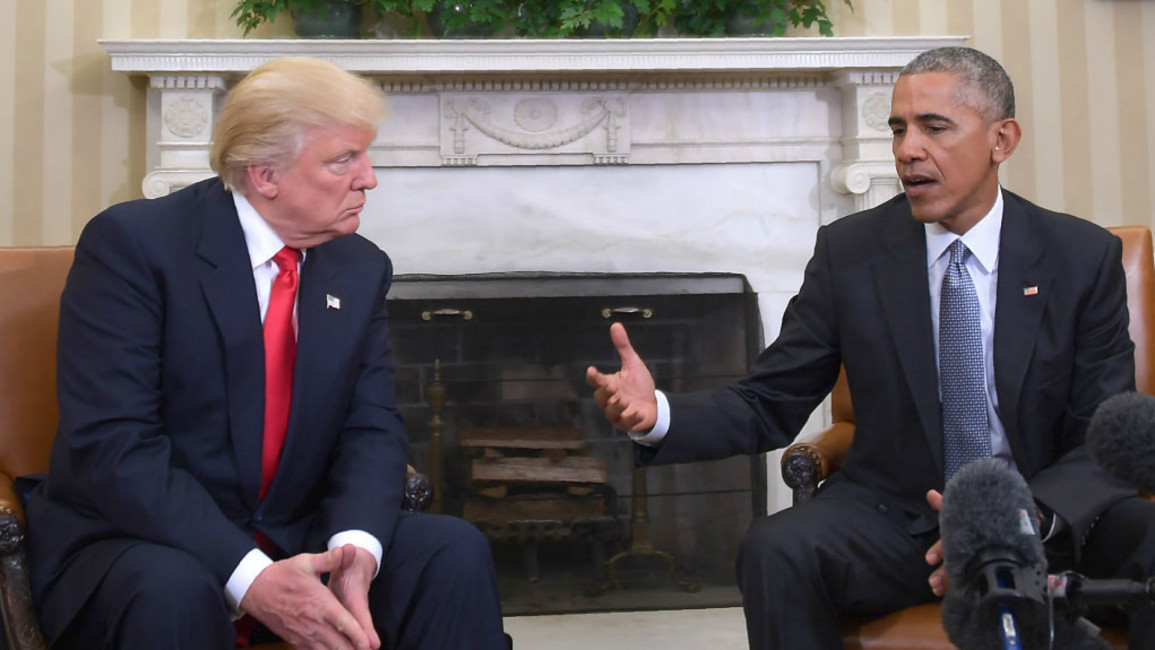
Trump and his Syria policy
In his first interview after the election with The Wall Street Journal, President-elect Trump almost repeated the position he had taken on Syria during the campaign.
Rather than ousting Syrian President Bashar al-Assad, he called for greater focus on fighting Islamic State in Syria. "My attitude was you're fighting Syria, Syria is fighting ISIS, and you have to get rid of ISIS. Russia is now totally aligned with Syria, and now you have Iran, which is becoming powerful, because of us, is aligned with Syria [...] Now we're backing rebels against Syria, and we have no idea who these people are."
In spite of his words, many experts argue that this perspective is far from the reality on the ground, since Assad has never focused on fighting IS, and Russia put all its power and arms into to crushing the Syrian armed opposition from Aleppo, rather than fighting IS in its Syrian headquarters of Raqqa.
If the US attacks Assad, Mr Trump said, "We end up fighting Russia, fighting Syria". If we take into consideration Trump's position on Russia, given he has never uttered a critical word on Putin, we can expect that he will go along with Russia in Syria.
This would be disastrous for the Syrian people who are coming under severe bombardment and attacks from the Syrian regime air power and Russian fighter jets, particularly in Aleppo.
Trump states "I've had an opposite view of many people regarding Syria". As he said in the interview, he builds his stance on Syria from a default position of opposition to President Obama or former opponent, Hillary Clinton.
This explains his support for a shift away from the current Obama administration policy which, he claims, aimed to find moderate Syrian opposition groups to support in the civil war.
 |
Given that Trump has never uttered a critical word on Putin, we can expect that he will go along with Russia in Syria |  |
This issue here is that the Syria crisis is not confined to the question of IS. Indeed, it has caused a whole host of other crises, such as the flight of Syrian refugees, which has become a global, not just Syrian problem.
In addition, on the question of transition, nobody can ignore the fact that the suffering of the Syrian people under the dictatorship of Bashar al-Assad has to end. Even if - as President Obama himself has done over the last five years, and as Trump is suggesting - you just try to ignore it, the issue will return.
This is because it is linked to the rise of extremism, and to the grievances of Syrians, who believe that the Assad regime is the source of the hate and injustice, and that he is using state violence against his own people; a reality that has been documented in many UN reports.
 |
A return to the pre-uprising Syrian status quo where Assad is the President of Syria, is inconceivable |  |
It is likely therefore that after reading all his assessment reports, President-elect Trump will have to face facts: A return to the pre-uprising Syrian status quo where Assad is the President of Syria, is inconceivable, even though he may well like to see or imagine a military victory for the Assad-Russia-Iran alliance in Syria.
This, however, is far from the reality due to the role of regional powers such as Turkey, Saudi Arabia and Qatar who are US allies in the region. For them, this would be the worst case scenario and they will fight to ensure it does not happen.
All these scenarios concerning Trump's policy over Syria will be clearer once he picks his Secretary of State.
A Republican from the establishment such as Senator Bob Cooker may expect Trump's position over Syria to be moderated a little in favor of the Syrian opposition, but should he decide to handle the file alone, we must anticipate an unpredictable US policy in Syria.
Dr Radwan Ziadeh is a Senior Middle East Analyst at the Arab Center Washington DC. Follow him on Twitter: @radwanziadeh
Opinions expressed in this article remain those of the author and do not necessarily represent those of The New Arab, its editorial board or staff.




